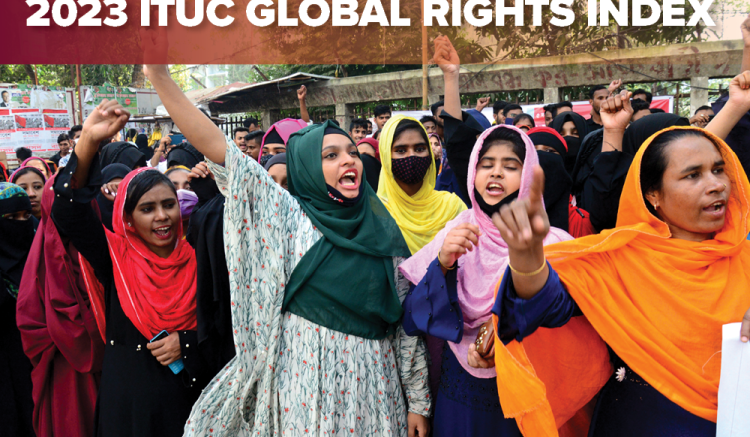On the last day of June, the International Trade Union Confederation (ITUC) released its annual “Global Rights Index”. It presented a bleak picture of a world where workers’ rights are routinely trampled upon. And according to the ITUC’s acting general secretary Luc Triangle, the report “provides shocking evidence that the foundations of democracy are under attack.” Protest by workers “has been met with increasingly brutal responses from state forces”, he said. “Violations of workers’ rights have reached record highs,” the ITUC concluded.
The report named the ten worst offenders in the world — Bangladesh, Belarus, Ecuador, Egypt, Eswatini, Guatemala, Myanmar, Tunisia, the Philippines and Turkey. Every one of those countries has a terrible track record on workers’ rights, and none of them is a genuine democracy. The ITUC report goes into considerable detail regarding each of the ten.
But it is a strange list. While some countries — Myanmar and Belarus, for example — have effectively destroyed their trade union movements, others have functioning unions, if embattled ones. Turkey, for example, still has a range of trade unions, and despite repression, strikes continue to occur. It is hardly in the same category as Myanmar.
Even stranger is the absence of the elephant in the room: China. China is well on its way to being the world’s most powerful economy, and its working class is the largest on the planet. Yet not a single worker in China — not one — is represented by a legal, recognised independent trade union. Hong Kong was the one place in China with free and independent trade unions. And those unions have been smashed, their leaders jailed. How is it possible that the ITUC report did not consider China as one of the ten worst places on earth for workers?
And worse than China, far worse, is North Korea. While in China there are workers’ struggles — despite the absence of trade unions — in North Korea, as far as we can tell, a brutal totalitarian dictatorship keeps a working class of millions in abject slavery. While the word “slavery” is often tossed around to describe deplorable working conditions, it is a highly accurate term in North Korea. Yet North Korea gets no mention in the ITUC report.
The trade union movements in Russia and Ukraine are nowhere mentioned (though there’s a single, passing reference to the war).
The ITUC’s annual report is, it must be said, a fantastic resource. It should be widely shared and widely read in the trade union movement. But it is incomplete, and one must hope this will change in future reports.
As I read the report, I could not help but wonder about the characterisation of this period as one in which workers’ rights are being respected less and less. If that is the case, one has to ask whether we in the labour movement are doing enough to fight for those rights — or even whether we should be doing something different.
My answers are that no, we are not doing enough. And yes, we should be doing something different.
To build support for embattled trade unions in places like Myanmar and Belarus (and China) means mobilising millions of union members in countries where their rights are more-or-less respected, such as the UK. But there is little evidence of that being the case. It may be argued that it’s difficult to mobilise workers to support workers in other parts of the world, especially when they are fighting to survive a cost-of-living crisis and hostile, right-wing governments at home.
The answer to that is a simple one: education. Trade union members must be educated to be internationalists. And that doesn’t just mean articles in union journals or the occasional guest speaker from abroad at a union congress. It means integrating trade union internationalism into the daily activity of all trade unions at all levels.
This will be a hard thing to do, but it is the only way to reverse the trend reported by the ITUC and begin to strengthen workers’ rights worldwide.
This article appears in this week’s issue of Solidarity.
